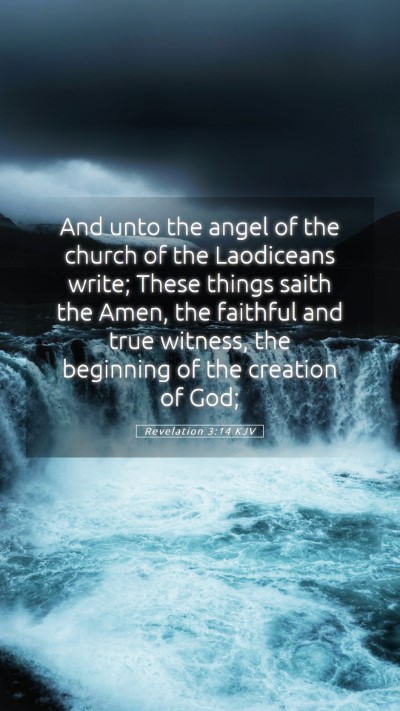Bible Verse Understanding: Revelation 3:14
Revelation 3:14 states:
"And unto the angel of the church of the Laodiceans write; These things saith the Amen, the faithful and true witness, the beginning of the creation of God."
This verse holds significant importance in the context of Christ's message to the churches in Revelation. Below, we will explore its meanings and implications, drawing from several esteemed public domain commentaries.
Key Themes and Insights
- Address to the Church: The verse begins by addressing the "angel of the church of the Laodiceans." This indicates Christ's directives are aimed at the church leadership, signifying their role in guiding the congregation.
- The Title of Christ: The descriptors “Amen,” “faithful and true witness,” and “the beginning of the creation of God” reveal significant theological truths about Jesus. Each title emphasizes His authority and reliability as the source of divine truth.
- Authority and Sovereignty: By referring to Himself as the “Amen,” Christ asserts His finality and authority, suggesting that He is the ultimate truth, validating the teachings that follow.
- Creation and Preeminence: Calling Himself the “beginning of the creation of God” highlights His role in creation, suggesting that He is not a part of creation but the one who initiates it, emphasizing His preeminence over all things.
Theological Implications
According to Matthew Henry, this greeting underscores Christ's authority over the church and emphasizes His unchanging nature. It signifies the need for the church to adhere to His teachings and to acknowledge His sovereignty. Albert Barnes elaborates by explaining that the term "true witness" highlights Jesus' unique position to authentically represent God's truth as opposed to the misleading sources of the world. Adam Clarke adds that Christ embodies the essence of faithfulness, showing that He is dependable in His promises and judgments.
Exegesis and Contextual Analysis
This verse must also be interpreted within the broader context of Revelation. It serves as the foundation for understanding the specific criticisms and praises that are directed toward the Laodicean church. Jesus’ character is asserted to emphasize the need for the congregation to recognize their shortcomings.
Condemnation of Lukewarmness
Subsequent verses reveal that the Laodicean church was "neither cold nor hot," indicating spiritual complacency. The contrast emphasizes that Christ desires a committed and zealous church. Matthew Henry states that Christ desires true devotion, urging Christians to reflect on their spiritual fervor.
Call to Repentance
The overarching theme of the book of Revelation is one of faithfulness through trials, a message that resonates through the letters to the churches. By defining Himself with these titles at the outset, Christ provides a solid foundation for His call to repentance and renewal.
Practical Applications
Understanding Revelation 3:14 involves recognizing the implications for contemporary churches and believers:
- Examination of Faithfulness: Believers are encouraged to evaluate their own faithfulness and truthfulness in their walk with Christ.
- Desire for Consistency: The message calls for a rejection of complacency and a pursuit of a passionate relationship with God.
- Recognition of Christ's Authority: Acknowledging Christ as the ultimate authority in life encourages submission to His teachings and commands.
- Encouragement in Leadership: Church leaders can find guidance in seeking to faithfully represent Christ's teachings to their congregations.
Related Scripture Cross-References
- John 1:1-3 - The preeminence of Christ in creation.
- Colossians 1:16-17 - The supremacy of Jesus over all creation.
- 2 Corinthians 1:20 - Christ as the “Amen” in God’s promises.
- Hebrews 13:8 - The unchanging nature of Jesus Christ.
- Matthew 7:21-23 - The distinction between true and false followers.
Conclusion
Revelation 3:14 serves as an essential reminder of the nature and authority of Christ. As believers engage with this scripture, they ought to root their understanding in the contextual and theological implications laid out by early church leaders and commentators.
For those participating in bible study groups or seeking bible study resources, this verse provides fertile ground for discussion and personal reflection, particularly concerning bible verse meanings and understanding Scripture.


